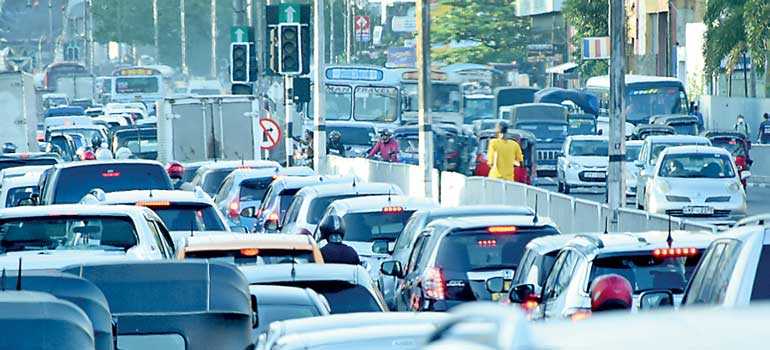Sunday Jan 25, 2026
Sunday Jan 25, 2026
Tuesday, 18 August 2020 00:56 - - {{hitsCtrl.values.hits}}

Heavy traffic was visible along several roads in Colombo yesterday as a result of the islandwide power failure. Traffic was visible as the signal lights in the streets went out of order with the power interruption – Pic by Kushan Pathiraja
By Nuwan Senarathna
and Asiri Fernando
The Power Ministry yesterday appointed a seven-member committee to investigate the countrywide blackout that left millions of Sri Lankans inconvenienced with businesses, water supply and even traffic coming to a standstill in the power outage, which lasted for more than eight hours in some areas.
Power Minister Dullas Alahapperuma who assumed duties last Friday said the committee will be made up of two members from the Ministry, two from the Ceylon Electricity Board (CEB) and two academics. They will meet today morning to commence their investigation. The report will be handed over to the Minister in one week. However, the Public Utilities Commission of Sri Lanka (PUCSL) has called for a report from the CEB to be presented within three days.
“I apologise for the power failure which affected every citizen in the country. It has affected the economic activities and functioning of the essential services such as hospitals. It has been less than a week that I was appointed as the Power Minister but I will not run away from my responsibility and will take necessary measures to prevent such incidents in the future,” Alahapperuma said.
He noted the Power Ministry officials and CEB officials have responded promptly and assured to work around the clock to prevent such power outage.
The power outage disrupted industry and economic activity as well as work in corporate offices around the country. The power outage also shut down the traffic light network causing heavy traffic congestion in multiple urban areas. Water supply was also hampered as pumping stations without backup generators were forced to cease function and await power restoration.
Despite the Power Ministry scrambling to reassure of power resumption in two hours, the outage, which began about 12.45 p.m., lasted for longer than eight hours in some areas. Initial reports from the CEB said that the power failure was caused by a technical glitch in a transmission line from the Kerawalapitiya grid substation.
“In the past decade there have been several countrywide blackouts. In 2009, then again 2015 and most recently during February and March 2016. In all these instances it took about five to six hours for power to be restored. Similarly in this instance as well all efforts are being made to restore power but it needs to be done in stages,” Power Ministry spokesman Sulakshana Jayawardena said.
Power had been restored in many areas including Uva, North Central and North Provinces by late evening, CEB Chairman Vijitha Herath told reporters. The CEB also assured that power had been restored to as much as 75% of the country by 9 p.m. yesterday.
However, multiple sources close to the CEB said that the technical issue attributed to the Kerawalapitiya grid substation also triggered partial failure of the Norochcholai power plant. Restoration of power was also delayed by the failure of the plant’s backup power system, which could not be brought online.
Kerawalapitiya Power Plant Chief Engineer confirmed that the plant was operational and ready to supply to the grid once the connection is restored.
Meanwhile, power regulator PUCSL ordered the CEB to submit two reports on the power outage in three days. The report containing the initial investigation on the cause of the failure and details of the restoration process should be submitted on or before 20 August.
The Trade Union Collective of the Ceylon Electricity Board (CEB) issuing a statement recalled the large investment made to establish a power grid stabilisation control centre in Battaramulla in the recent past. The collective questioned why the new centre failed to prevent any countrywide power outage, calling on President Gotabaya Rajapaksa to appoint a Presidential Commission to inquire into corruption and malpractice in the CEB.
When the previous countrywide power failures took place in both 2009 and 2015 the PUCSL wrote to the CEB with several recommendations on how to avert a future blackout, documents seen by the Daily FT showed.